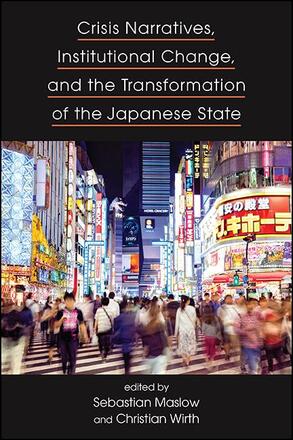
Crisis Narratives, Institutional Change, and the Transformation of the Japanese State
Alternative formats available from:
Looking at Japan, traces crisis narratives across three decades and ten policy fields, with the aim of disentangling discursively manufactured crises from actual policy failures.
Description
Mired in national crises since the early 1990s, Japan has had to respond to a rapid population decline; the Asian and global financial crises; the 2011 triple disaster of earthquake, tsunami, and the Fukushima nuclear meltdown; the COVID-19 pandemic; China’s economic rise; threats from North Korea; and massive public debt. In Crisis Narratives, Institutional Change, and the Transformation of the Japanese State, established specialists in a variety of areas use a coherent set of methodologies, aligning their sociological, public policy, and political science and international relations perspectives, to account for discrepancies between official rhetoric and policy practice and actual perceptions of decline and crisis in contemporary Japan. Each chapter focuses on a distinct policy field to gauge the effectiveness and the implications of political responses through an analysis of how crises are narrated and used to justify policy interventions. Transcending boundaries between issue areas and domestic and international politics, these essays paint a dynamic picture of the contested but changing nature of social, economic, and, ultimately political institutions as they constitute the transforming Japanese state.
Sebastian Maslow is Senior Lecturer in International Relations at Sendai Shirayuri Women’s College in Japan. He is the coeditor (with Ra Mason and Paul O’Shea) of Risk State: Japan’s Foreign Policy in an Age of Uncertainty. Christian Wirth is Research Fellow at the German Institute for Global and Area Studies (GIGA) and Adjunct Research Fellow at the Griffith University Asia Institute. He is the author of Danger, Development and Legitimacy in East Asian Maritime Politics: Securing the Seas, Securing the State.
Reviews
"Collectively, these ten chapters contribute to our understanding of the post-Abe political economy in Japan." — Japan Review
"As crisis and precarity become regular features of our 'new normal,' Crisis Narratives, Institutional Change and the Transformation of the Japanese State is a timely collection of essays. It provides us with a single point of reference on the scope, scale and impact of the various crises faced by the Japanese state and its people over recent years, as well as the diversity in responses. In fact, it was a crisis—the triple disasters of 2011's earthquake, tsunami, and nuclear meltdowns—that provided the editors with the inspiration for this volume and they are to be applauded for extending their analysis beyond this milestone event and assembling a balanced and representative team of expert contributors across a wide range of topics from the social via the political to the economic, from the domestic to the international. Both individually and collectively, these essays represent a must-read for anybody curious about recent developments in Japan and where the country might be headed." — Hugo Dobson, University of Sheffield
"This innovative, broadly conceived volume offers a series of fresh, up-to-date, convincing portraits of recent political, diplomatic, economic, and demographic challenges facing Japan. Rather than cataloguing 'Japan's Problems,' it incisively adopts a cohesive theoretical stance on crisis narratives, showing how pervasive accounts of national decline become opportunities for political entrepreneurs to enact their visions of a stronger, more secure Japan, even when their proposed solutions are at best partial or even ruinously self-serving. Judicious, compelling, and insightful, this volume makes important contributions to our understanding of the problems and problematic solutions now facing advanced industrial nations." — David Leheny, Waseda University